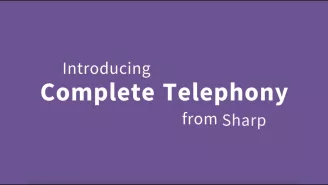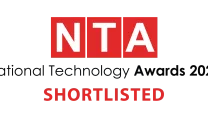Cloud-based phone system for business
As a cloud-based phone system, Hosted Telephony allows businesses to operate their phone services online, preventing the need for additional hardware and infrastructure investments.
In addition to high maintenance and installation costs, traditional hardwired phone systems can often lead to a wide range of problems, including call quality drop-offs. Hosted Telephony solutions are very similar; however, due to call traffic being fully cloud-based, you can guarantee maximum uptime from any location. This means that your team can easily make and receive calls from wherever they are, from their desk phone, PC (including Macs), or via a mobile app. You can further benefit from our solution as our technicians can also make changes remotely.

What are the benefits of a hosted telephony service?
Cost Savings
Add or remove users and features as needed, without incurring additional hardware costs. We offer a single fixed monthly fee for each user and guarantee no hardware maintenance contracts or software update costs to ensure your costs stay low.
Scalability
Configuration, installation, and setup are simple; all you need is an internet connection. Licenses can be easily added or removed in line with the changing needs of your business.
Flexibility
Employees can make and receive calls from any location with internet access, using any device with VoIP phone systems. Our solution also provides a variety of handset compatibility options, including smartphones, IP (Internet Protocol) handsets, and desktop apps.
Advanced Features
With our VoIP solutions, you can gain advanced features such as Voicemail-to-Email, Real-Time Call Analytics, and Virtual Queuing.
Integration
Our Hosted Telephony can integrate with other business tools such as Customer Relationship Management (CRM) systems, email, and collaboration platforms.
Fixed Costs
There are no expensive hardware installation or maintenance costs to worry about. Fees are charged on a per-month, per-user basis and can be added or removed as required.
Easier Remote Fix
Gone are the days of telephony engineers visiting your workplace to fix phone lines. Cloud telephony support is provided by a remote helpdesk, with almost all maintenance issues being fixed over the phone.
Call Recording System
Our solutions feature a call recording system to ensure your organisation meets compliance requirements.
Our Cloud Telephony Service
Unified Communications: If your team works from various locations or doesn’t have a static desk, they can now easily make and receive calls from wherever they are, from their desk phone, PC (including Macs) or via a mobile app.
Single Point of Contact: A single point of contact and ownership for all your Telephony, IT needs and issues, helping to ensure seamless communication, efficient management of electronic records, and robust cybersecurity.
UK Cloud-Based Service: Totally cloud-based (in the UK, so no GDPR nasties), meaning no reliance on equipment in your building, such as phone servers/PBX’s. This reduces maintenance costs, enhances scalability, and allows secure access to communication tools and client data from anywhere.
Simple Licensing: Single monthly fee for each user to help streamline budgeting and financial planning.
Remote Changes: Have a new team member starting? No problem, through our remote support, we can deliver you a new phone to either your office or their home that will set itself up as soon as it’s plugged in.

Why choose us as your Hosted Telephony provider?
By partnering with us for our VoIP services, you’ll have the backing of a large organisation, meaning you have access to a nationwide network of highly skilled, technical telephony experts. A dedicated team of local technicians will be available to provide support and guidance whenever you need it. With over 30 years of experience in IT Support and delivering Hosted Telephony across various industries, we can confidently tailor our cloud-based phone services to meet your specific needs. This ensures streamlined operations, increased efficiency, and enhanced productivity for your business.
With the UK’s PSTN and ISDN networks already on their way to being decommissioned, hosted telephony is the new normal in business communications. Our telephony solutions are flexible and fully cloud-based, guaranteeing maximum uptime from any location. For a transparent fixed fee, you’ll be supported by a nationwide team of expert telephony engineers. If you’re interested in finding out how we can tailor our Hosted Telephony solutions to meet the needs of your organisation, don’t hesitate to get in touch.

Hosted Telephony and ISDN Lines
While the concepts of both are similar in terms of being within the realm the telecommunications, hosted telephony and digital voice are not the same.
Hosted telephony refers to the delivery of telephony services over the Internet using Voice over Internet Protocol (VoIP) technology to connect voice calls as data packets over an IP network. The service is hosted in the cloud (the internet), allowing businesses to make and receive calls using VoIP-enabled phones or softphones – all that is required is internet access.
Digital voice, also known as digital telephony or digital voice service, refers to a type of telephone service that uses digital signals to transmit voice data. Digital voice services can be delivered over various technologies, including traditional copper lines, fibre optic cables, or internet connections. Digital voice services can be provided by both traditional telecommunications providers and hosted telephony service providers.
Hosted telephony is a specific implementation of telephony services using VoIP technology, whereas digital voice refers to the broader concept of delivering voice communication in a digital format.
In 2027, ISDN (Integrated Service Digital Network) lines, aka traditional phone lines, officially became obsolete, which many people are calling the BT ISDN Switch Off. This means that the traditional copper network lines that we traditionally used to make calls from desk phones will be a thing of the past, as we shift to IP (Internet Protocol) phone systems. The decision to end ISDN services was driven by several factors, including:
- ISDN technology has been around for several decades and is considered outdated compared to modern digital communication methods. It has limitations in terms of data transfer rates and the ability to support advanced features and applications.
- The industry has been moving towards IP-based communication, where voice and data are transmitted over internet connections.
- ISDN infrastructure requires significant investment and maintenance. Phasing out ISDN allows telecom providers to focus on more efficient and cost-effective technologies.
Check out our blog for more information: ISDN Lines Are Ending in 2027 - What This Means for You
Phone lines evolved from analogue POTS (Plain Old Telephone Service) to Digital ISDN, DSL (Digital Subscriber Line), fibre optics, and finally to VoIP and hosted telephony using the internet. Learn more about each below:
- Analogue POTS (Plain Old Telephone Service): Analogue POTS lines were the standard telephone lines used in the early days of telephony. These copper-based lines transmitted voice signals in analogue form and provided basic voice communication services.
- Digital ISDN (Integrated Services Digital Network): ISDN lines emerged as an upgrade to analogue lines in the 1980s. ISDN enabled the transmission of voice, data, and video signals over digital lines. It offered faster data transfer rates and the ability to handle multiple channels simultaneously.
- DSL (Digital Subscriber Line): DSL technology, introduced in the late 1990s, allowed the simultaneous use of voice and data services over traditional copper lines. DSL provided faster internet connectivity by utilising higher frequencies not used for voice transmission.
- Fibre Optic Lines: Fibre optic lines use thin strands of glass or plastic to transmit data as pulses of light. They offer significantly higher bandwidth and faster data transfer rates compared to copper-based lines. Fibre optic technology has become increasingly prevalent for both voice and data communication.
- VoIP (Voice over Internet Protocol): VoIP technology revolutionised communication by transmitting voice calls over the Internet instead of traditional phone lines. VoIP converts voice signals into data packets and transmits them over IP networks. It provided cost savings, flexibility, and rich features, leading to the popularity of services like Skype and other internet-based calling applications.
- Hosted Telephony and Cloud Communication: Hosted telephony, also known as cloud telephony or hosted VoIP, emerged as a popular alternative to traditional phone systems. It involves outsourcing telephony services to a provider, such as Sharp, who hosts the necessary infrastructure and software in the cloud. Hosted telephony leverages the power of the internet to deliver advanced communication features, scalability, and cost savings.
These advancements in telephony have gradually shifted communication from traditional analogue lines to digital and internet-based technologies. Today, many organisations and individuals rely on VoIP, hosted telephony, and other IP-based solutions for their voice communication needs, taking advantage of the flexibility, cost-effectiveness, and advanced features they offer.











